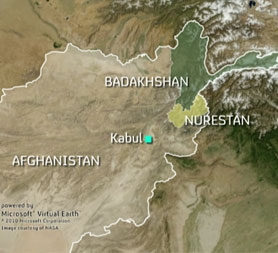Murdered medics: was the Taliban responsible?
Updated on 08 August 2010
As Afghan police hunt the killers of Briton Dr Karen Woo and her colleagues, Channel 4 News's Alex Thomson looks at the two competing theories surrounding their murders.

During the years of the Taliban government in Kabul, as the new century began, only two areas in the whole of Afghanistan had not fallen to the followers of Mullah Omar now controlling virtually all of Afghanistan.
Those areas were the Panshjir Valley running northeast almost from the capital Kabul - the ultimate Afghan stronghold against the years of Russian occupation.
And leading out over the 11,000 foot Anjamam Pass at the northern end of the valley: the wild open steppes and high mountains of Badakhshan.
Both the Valley and the Province of Badakhshan are almost exclusively populated by Tajiks, They are the ethnic group whose fighters in the Northern Alliance mujahadeen, would one sunny morning offer me and the Channel 4 News team a lift as they rolled their ancient tanks down from the mountains into Kabul, to seize power after the US invasion of 2001.
So Badakhshan is the very last area of Afghanistan where you would expect to find insurgent or Taliban activity.
Afghan police hunt medics' killers
The bodies of the eight medics killed in Afghanistan, including Briton Dr Karen Woo who was engaged to married, are due to be flown to Kabul today. Channel 4 News spoke to Dr Woo's friend of the "huge shock".
The Christian aid group International Assistance Mission (IAM) said today it was coordinating efforts to recover the dead with the United States embassy.
"We just heard news from the American embassy that they are going to recover the bodies today. Yesterday they tried but the weather was not good enough for helicopter to go in, so hopefully the bodies will be back in Kabul today," said Dirk Frans chief executive of IAM.
Read more here.
Such groups would find it extremely hostile ground in which to exist. Ethnic Pashtuns likely to support the insurgency would be noticed by Badakhshan's Tajiks as outsiders.
They would not even speak the language. They would be viewed with the usual ethnic suspicions which demarcate and divide this country so profoundly even in times of peace.
It's that obvious. You or I can instantly tell the difference between the central European features of the Tajiks and the heavier-bearded, aquiline features of the Pashtun. It's not long before you can pick up the difference in the languages too.
Even in the dusty, sleep capital of Fayzabad it would be hard to take root or plan operations. Not least because the fighting season in this area is far shorter than the desert south.

This is a land of high steppes and the jagged peaks of the Hindu Kush mountains and the High Pamirs stretching into Pakistan and China - the great western ranges of the Himalayas.
Indeed Chinese influence here is far greater than Pashtun or Pakistani. You will see convoys of Chinese trucks and graders busily taking advantage of the two things Badakhshan offers which are so rare to get together in Afghanistan: foreign aid money and investment and the security to make good on it.
So China’s been quick to exploit this during the years of peace. And in Badakhshan they have been real years of peace.
Notorious for its bitter winters and deep snows - Fayzabad itself can be cut off from the rest of Afghanistan for days on end every winter. It is a certainty and indeed a way of life that the mountain villages absolutely will be cut off for months every year. Even for the hardiest of insurgents this is not a conducive fighting environment then, either ethnically or climatically.
Go south - in Kandahar and Helmand and the vast southern sweep of ethnic Pashtun areas, here the insurgents will have fighters who speak their language, villagers who support their aims and an all-year fighting season. They have neither, up in the far north-east of the country.
All of which is why this has been critical ground for aid groups. Like neighbouring Nuristan where these doctors had been working, it is one of the poorest provinces in the country. Which makes it one of the poorest places on earth.
The visiting reporter in Kabul, wanting a change from the battlefield south, will quickly be offered flights with aid organisations out to the north-east where infant mortality and female death rates are pitifully high in the twenty-first century, even by Afghan standards.
The relative safety of Bakahshan has made this all the more feasible as an area of western medical charities to operate in.
But Afghanistan is nothing if not an ethnic patchwork. Next-door in neighbouring Nuristan Province, the tribal mix and ethnic backgrounds are far more diverse and the insurgent fighters have operated here with considerable success for several years now.
Which leaves us with two competing theories.
First, this was simply a bandit attack and armed bandits are incredibly common in lawless mountainous Afghanistan.
A lot of property belonging to these doctors was stolen and that is rather unusual in a Taliban attack.
Equally there was no apparent attempt to take hostages. These people would have high market value in the vibrant Afghan kidnap market.
The insurgents tend to claim responsibility for operations like this quickly. They did not do so in this case, suggesting they're taking advantage of it, not committing it.
The Badakhani authorities insist it was a criminal gang not an insurgent attack and the lack of a Taliban claim for some days since it happened lends some further credence to this theory.
Equally, the Badakshanis will do anything to deflect any hint that insurgent activity is taking place in their hitherto peaceful state
But the second theory is not without its merits. The Taliban knew these people were at work in Nuristan and followed them out when they left. We know the insurgents want to spread their operations across the country, particularly into areas where NATO wants to urgently hand security control to the Afghan army and police. Badakhshan would be Number One on that wish list.
What better place then, to mount such an operation.
And we know from Afghan survivors, one fact which will surprise not a single Afghan, no matter where, no matter what ethnicity: the accents and language of the men who carried out the massacre were Nuristani, not Badakhshani.
Why would bandits travel so far from their homeland and known escape country, let alone slaughter needlessly the people they had already successfully robbed?



